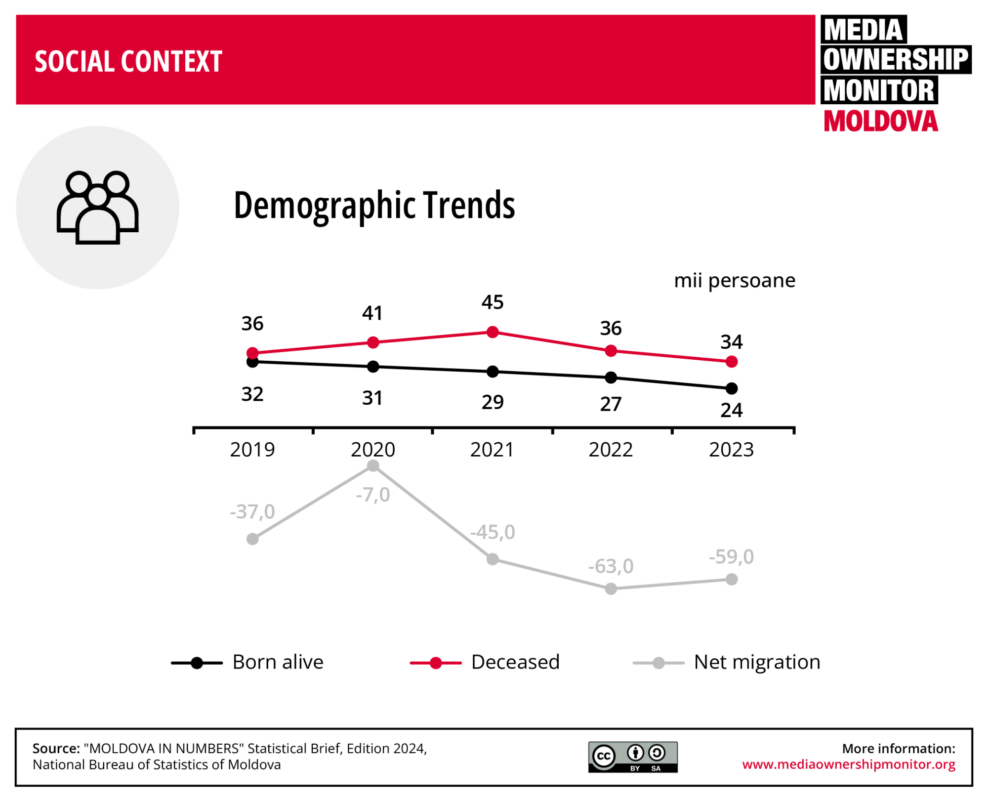Society
Moldova gained independence from the Soviet Union in 1991. According to provisional data from the National Bureau of Statistics, as of January 1, 2024, the country has a population of approximately 2.42 million. Encompassing 33,800 square kilometres, Moldova borders Romania to the west and Ukraine to the north, south, and east. A significant portion of its citizens - over one million - live and work abroad, with almost an equal number holding Romanian citizenship.
The structure of government in Moldova follows the model of a parliamentary republic, with a parliament of 101 seats elected by popular vote. The president, who is also democratically elected, plays a key political role, including the responsibility of appointing the prime minister on the recommendation of the parliamentary factions. The legislative, executive and judicial branches operate independently but cooperate to fulfil their constitutional mandates.
The country is divided into 32 districts, 13 municipalities, and two autonomous regions: Transnistria and Gagauzia. Transnistria, located in the eastern region between the Dniester River and Ukraine, unilaterally declared independence in September 1990 but is not internationally recognised. It is politically and financially controlled by Russia, which maintains a heavy military presence there. Gagauzia, an autonomous region in southern Moldova with its administrative centre in Comrat, is predominantly inhabited by the Gagauz people. The Gagauz are a Turkic-speaking ethnic group who, while culturally aligned with Turkish peoples, practise Orthodox Christianity. This territory is officially designated as the Autonomous Territorial Unit of Gagauzia.
Chișinău, Moldova's capital and largest city, has an estimated population of approximately one million residents according to unofficial data.
In 2023, the average gross monthly salary was 12,300 MDL (approximately 650 USD), representing a 17.3% increase from 2022 in nominal terms and a 3.4% increase in real terms (adjusted for the consumer price index). A significant portion of household income—11.1%—comes from money transfers received from abroad.
Most employed individuals work in the services sector (57%) and agriculture (20%), while industry and construction account for 14.6% and 7.3% of employment, respectively, among those aged 20-64.
Life expectancy at birth is 76.4 years for women and 67.5 years for men. In 2023, approximately 24,000 children were born, a decrease of 3,000 (11%) compared to 2022. Diseases of the circulatory system remain the leading cause of death, accounting for over half of all fatalities.

In 2023, the employment rate for those aged 20-64 was 55.7%, up from 52.1% in 2022. Men are more active in the labour market, with an employment rate of 58.8% compared to 53.0% for women, resulting in a gender gap of 5.8 percentage points.
During the 2023/2024 academic year, the educational system consisted of 1,310 institutions, serving a total of 437,000 pupils and students — a decrease of 300 students from the previous year.
According to the 2014 census, about 80% of the population reported speaking Romanian, although more than half identified it specifically as "Moldovan". The country's ethnic composition includes a majority of Moldovans/Romanians, followed by Ukrainians, Gagauz, Russians, Bulgarians, and Roma. The census also revealed that 96.8% of the population identifies as Orthodox Christian.
As reported by the Public Opinion Barometer in August 2023, the internet is the primary source of information for Moldovans (53.6%), followed by TV (30.1%). The internet also ranks as the most trusted source of information, with 38.5% of the population expressing confidence in it, compared to 20.3% for television.
Moldova formally submitted its European Union membership application on March 3, 2022. The European Commission issued its opinion on June 17, 2022, followed by the European Council granting Moldova candidate country status on June 23. A significant milestone was reached in December 2023 when the European Council launched EU accession negotiations with Moldova. The country has benefited from a visa-free travel arrangement with the EU since 2014.
On October 20, 2024, Moldova held a referendum on constitutional amendments to formalise the country's European aspirations. Voters were asked to decide whether to make EU membership a "strategic objective" and declare the "irreversibility of the European path" in the Constitution. With a valid turnout of 50.72%, the measure passed by a slim margin: 50.35% voted "YES" and 49.65% voted "NO," clearing the way for constitutional changes.

